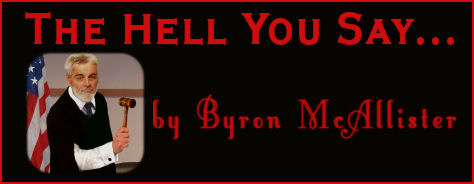 |
A Bit of Undiscouragementness for Writers (Title vocabularity apologias to, among others, Sarah Palin)
At one time, writing was a visible, perhaps even a conspicuous profession, thought highly of by much of the public. So all one needed, in order to become a successful writer was a lot of talent and some way to get a good start—an acquaintance in the printing business could help, or a lot of money in the family. These days, writers tend to be the invisible people who generate the witty lines delivered by film and TV actors, who then get credit for them. Not all, however: some are the invisible people who write the books that sell because they are attributed to celebrities. In the mystery field, the situation is hard to fathom, because, to all appearances at least (can you believe this?), the person who writes the book gets the credit. I suppose there may be exceptions, but to us ordinary people (non-writers and not-quite-yet writers included here), exceptions are not well known. There are also writers of advertising copy, and they are paid and unknown but they have nothing to do with mystery writing. And there are mystery writers who “come from somewhere else,” such as academia or a family of people known for their previous connection to successful writing, and nobody can begrudge them their success: they have the “right” background for it. Or at least one such “right” background. Whatever gives them a legitimate and recognizable claim, establishable before an editor will look at their stuff, to a “way with words.” Because word processing makes some aspects of writing easier than it ever was, there are way more aspiring writers (mystery writers, I mean, but for some reason there are others) around today than there ever used to be. Can we give any of them any encouragement? Let us first look to religion, one of the most well-known sources of encouragement of all sorts. Do you recall the Parable of the Talents? An obvious tale to cite, since talent, in addition to its monetary significance, has a meaning closely related to potential success in any sort of art, writing included. In that tale, a boss gives each of his employees money to guard while he takes a vacation or a business trip or whatever it is that carries him away for a while. Some of them invest the money, and when the boss gets back hand over not only what they were entrusted with, but more besides. Others, afraid of losing in the markets, have kept the money safe, but didn't invest it, and can return only the amount they were to guard. The story doesn't mention anyone who invested the money, lost heavily, and could only hand back a portion of the boss's cash. (Perhaps at that time the market was in such a strong upward swing that losses would be impossible? That'd be encouraging in itself.) The boss proceeds to reward those who made him money and condemn the ones who didn't contribute to his increasing wealth. Clearly this is an endorsement not only of greed on the part of bosses, but more especially of risk-taking on the part of those entrusted with talents. The clear moral for mystery writers is that one should go ahead and produce whatever the market appears to demand, in hopes of increasing the wealth of the publishing industry, and hence of oneself. This surely must be encouragement! As an aside, the widespread advice to “write according to your own heart, not according to the wishes of others” is thereby debunked. It may be an idea propagated mainly by people who want to limit their competition, or perhaps by the irreligious. I seem to recall another Biblical story where people hired late in the harvest are given the same reward as those who toiled longer because they started earlier. For mystery writers, the fact that this was indicated to be just holds two implications. On the one hand, it means that twenty-first century entrants into the field deserve publication advances just as great as the old-timers are getting. On the other, it also suggests waiting to take up a particular fad (mass murders, child murders, etc.—whatever the news of the day indicates the public may currently be interested in) until it is seen, for sure, to be the coming thing in mystery fiction. The encouragement, here, may be construed as, on the one hand, for confidence in one's immediate financial success, and on the other hand for a certain amount of patient indolence, giving one time to spend tweeting one's followers, blogging one's opinions, friending others on Facebook, etc. while one waits to see which way to jump before settling down to actual production. There are other bits of encouragement for mystery writers available from the same source. For example, the story of the widow's mite teaches us that the advice to always “toot our own horn” may have problems, although in a field where recognition is the proverbial name of the game, this may require interpretation. The part about the rich, the camel, and the needle's eye encourages us not to bother about getting rich from our work, since it would only make things more difficult for us if it happened. And the above doesn't even finish summarizing religious encouragement for mystery writers, let alone possible encouragement from other fields, such as art, science, politics, and so on. The world, after all, is well known to be so full of a number of things, we are all to be encouraged to be as happy as, who was it, exactly? Corporate CEOs, perhaps. Somebody who has it made, anyhow. |
|
|
Past issues and stories
pre 2005.
Subscribe to our mailing
list for announcements.
Submit your work.
Advertise with us.
Contact us.
Forums, blogs, fan clubs,
and more.
About Mysterical-E.
Listen online or download
to go.
|
|
|
 |
 |

